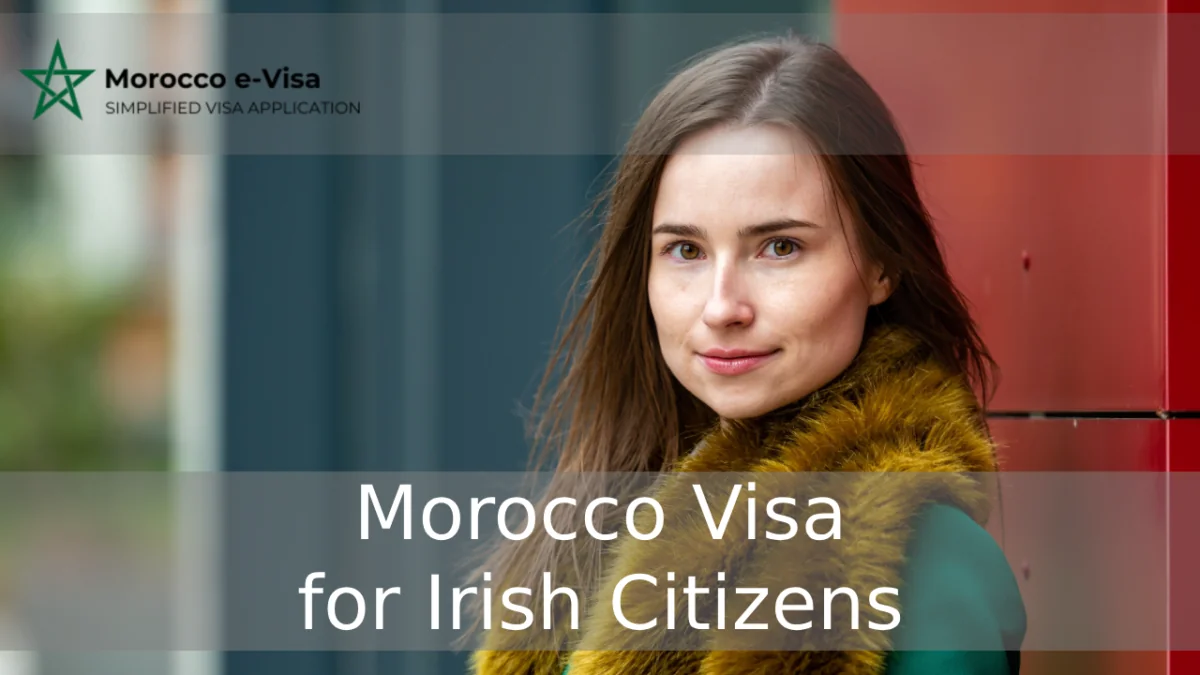
Irish citizens need a visa to Morocco if they stay in the country is more than 90 days or for specific reasons, such as work.
For short visits under 3 months, no visa is required, and entry is granted upon presenting a passport.
However, it is essential to make sure that the passport remains valid for at least 6 months beyond the planned travel dates.
If the purpose of the visit includes work, study, or other long-term commitments, a visa application is mandatory before arriving in Morocco.
Visitors from Ireland are advised to check the latest visa regulations with the Moroccan Embassy or Consulate in their country.
NOTE: Additionally, obtaining travel insurance and confirming accommodation arrangements are highly recommended for a smooth entry process into Morocco.
Types of Morocco Visas for Irish Citizens
Irish citizens visiting Morocco need to choose the right type of visa based on the purpose and duration of their stay.
There are several Morocco visa options available, such as Short-Term Visas, Long-Term Visas, Transit Visas, and Visas on Arrival.
- Short-Term Visas
Short-term Visas are for stays of up to 90 days in Morocco. These are the most common types for Irish travelers.
These permits enable one to enter Morocco for non-immigration purposes, either for a single uninterrupted stay or multiple short stays if issued as a multiple-entry visa.
- Long-Term Visas
A Long-Validity Visa is a multiple-entry permit granted by Moroccan diplomatic or consular authorities.
This visa may be valid for up to one year, with each individual’s stay limited to a period between one and 90 days.
Irish nationals holding a Long-Term Visa who intend to remain in Morocco for longer than 3 months must apply for a Residence Permit through the appropriate office of the General Directorate of National Security.
- Transit Visas
A Transit Visa applies if you are passing through Morocco to another destination and plan to stay at the airport or within Moroccan territory for a short period (usually less than 72 hours).
Irish citizens intending to visit Morocco for less than 90 days do not need to apply for a visa in advance.
Instead, they are granted visa-free entry upon arrival in Morocco. This eliminates the need for additional paperwork or fees for short-term visits.
Also, under special or urgent circumstances, permits may be issued at border posts by Moroccan security services.
Documents Necessary to Apply for Morocco Visas
When Irish citizens apply for a Moroccan visa, it’s essential to gather all the documents for a smooth application process.
The following papers may be needed, depending on the type of visa:
- Copy of the passport: Make sure it is valid for at least 6 months from your planned date of entry into Morocco.
- Clear face photograph: Provide a recent photo that clearly shows your face, meeting the standard visa requirements.
- Invitation letter: If you are visiting friends or family, include an invitation letter from your host. For business purposes, a formal letter may be required.
- Proof of sufficient funds: Show files that you have enough money to cover your stay in Morocco, such as recent bank statements.
- Evidence of accommodation: Submit proof of where you will stay, like hotel bookings, a rental agreement, or a letter from your host.
- Travel insurance: Provide a valid travel insurance policy that covers you during your stay in Morocco, including medical emergencies.
- Onward/return ticket: Include a copy of your confirmed flight reservation or ticket to show your return or onward travel plans.
Having these documents prepared and organized will help with the visa application so that it can be processed without unnecessary delays.
How Long Can an Irish Citizen Stay in Morocco with a Visa
The length of stay in Morocco depends on the type of visa or entry permission granted.
Generally, Long-Term Visas may be valid for up to one year, but each stay is usually limited to between one and 90 days.
Transit Visas allow a stay of less than 72 hours while traveling to another destination.
Extensions or Residence Permits must be requested from the General Directorate of National Security before the permitted stay ends.
Overstaying in Morocco can result in fines, deportation, or restrictions on future travel.
Application Process for Morocco Visa
Irish travelers may need to apply for an electronic visa if their primary nationality differs, if they live outside Ireland, hold other visas, or have a specific passport type. In such cases, the process includes:
- Visit the official Moroccan visa website at https://www.acces-maroc.ma/ and select the “Apply for an eVisa” option.
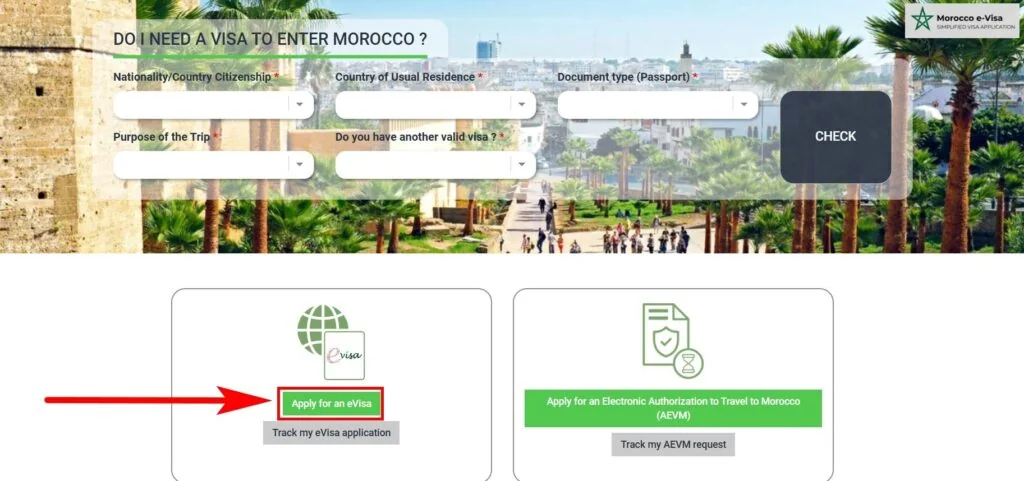
- Type in your email address, confirm it, and click “Enter”.
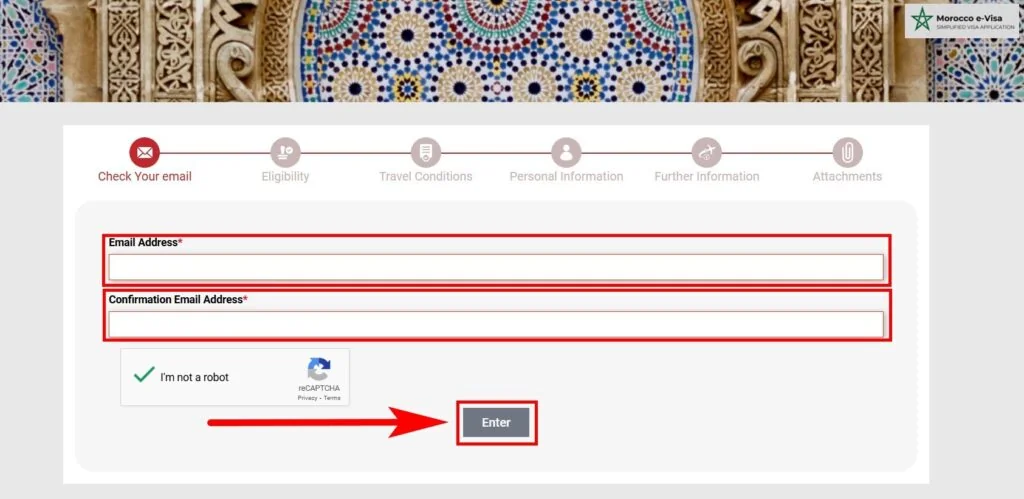
- Open your email inbox and click the verification link sent to you.
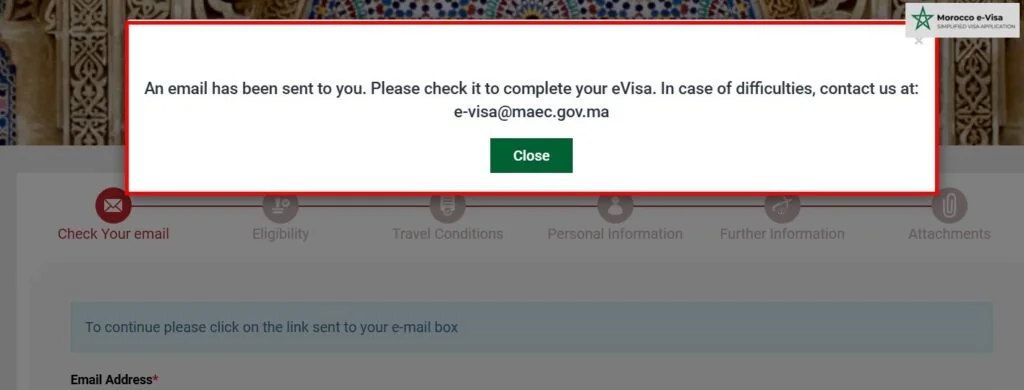
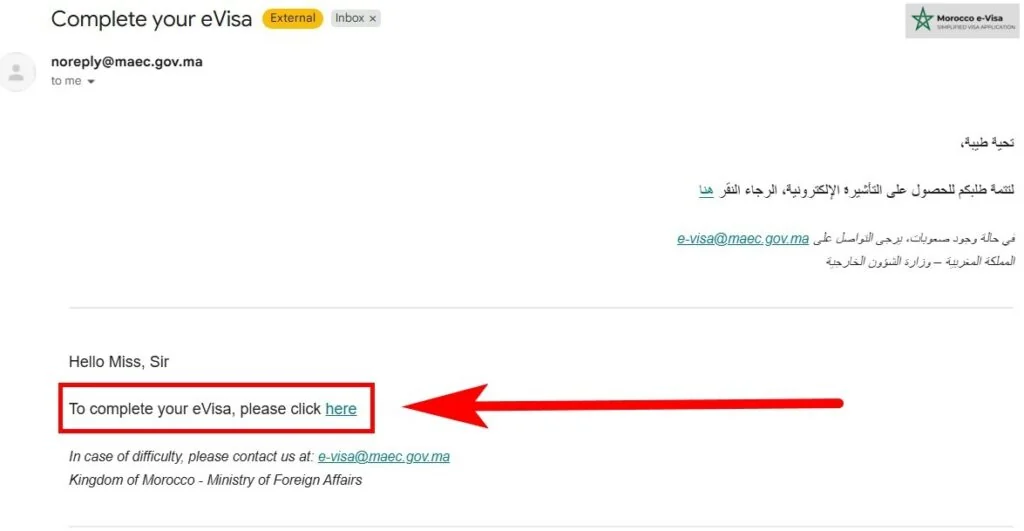
- Fill out the initial application form with your basic details (Nationality, Current country of residence, Date of birth, Passport type, trip purpose, and details of any valid visa or residence permit), then press “Next”.
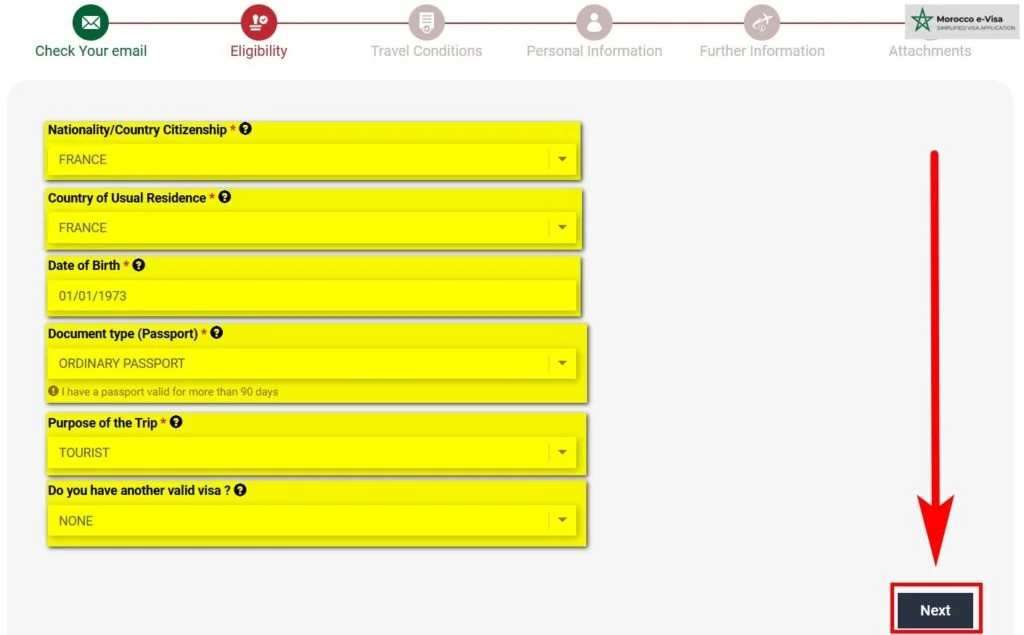
- Read the travel conditions, tick the consent checkboxes, and click “Next”.
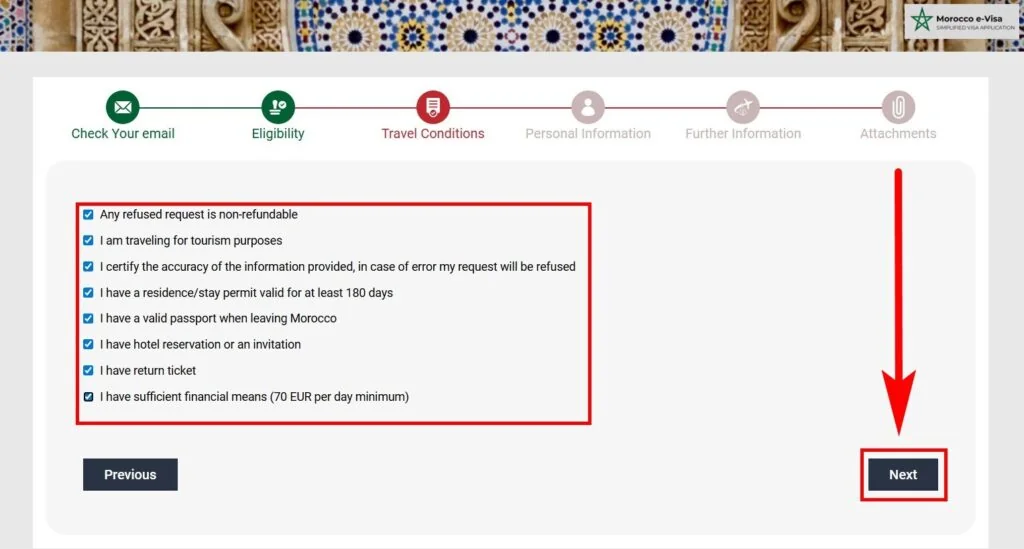
- Provide your personal details exactly as shown in your passport.
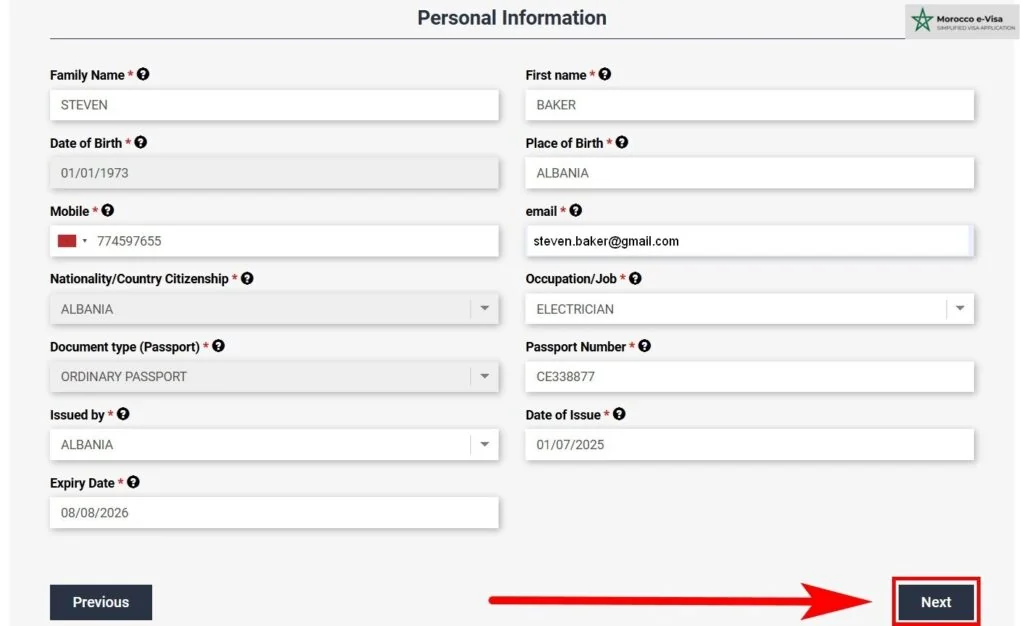
- If prompted, complete the “Further Information” section—this usually includes your planned arrival and departure dates for Morocco—then select “Next”.
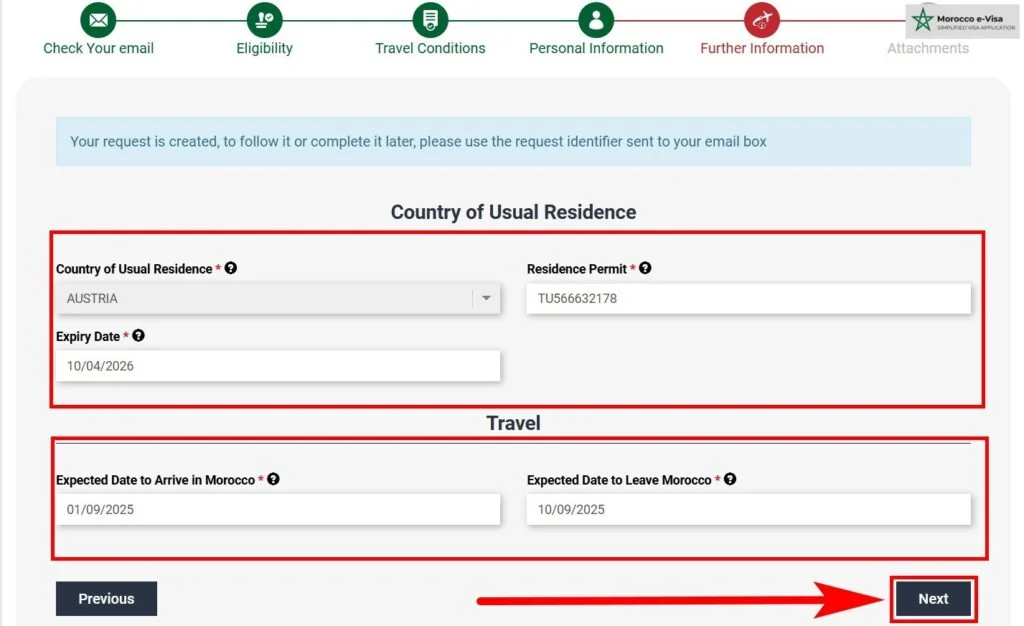
- Upload all necessary documents (a recent passport-style photo, a scan of your passport’s bio page, and—if applicable—a valid visa or residence permit), then click “Save”.
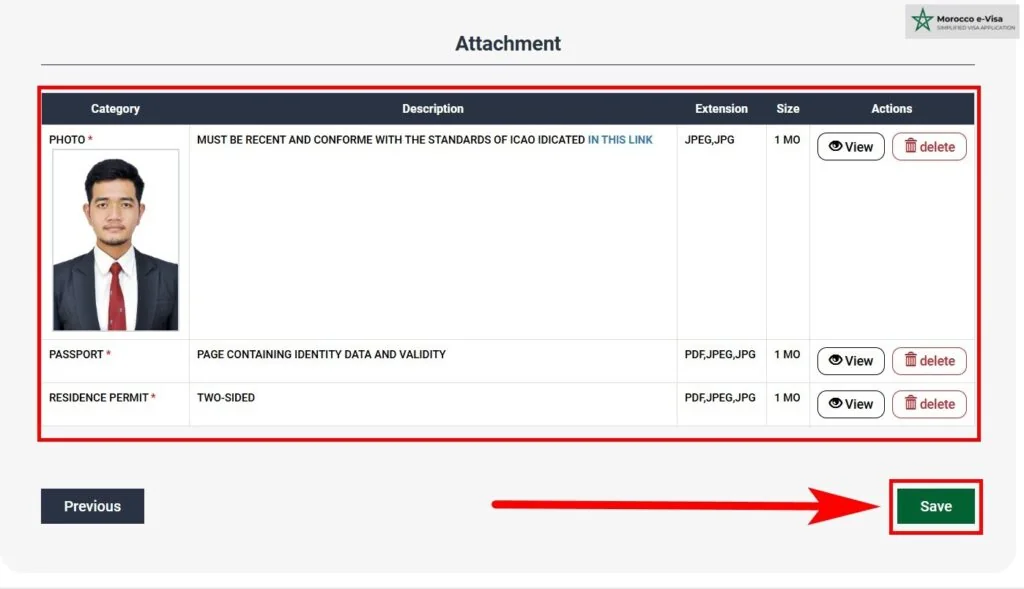
- You will see a message indicating your visa’s validity dates and permitted length of stay.
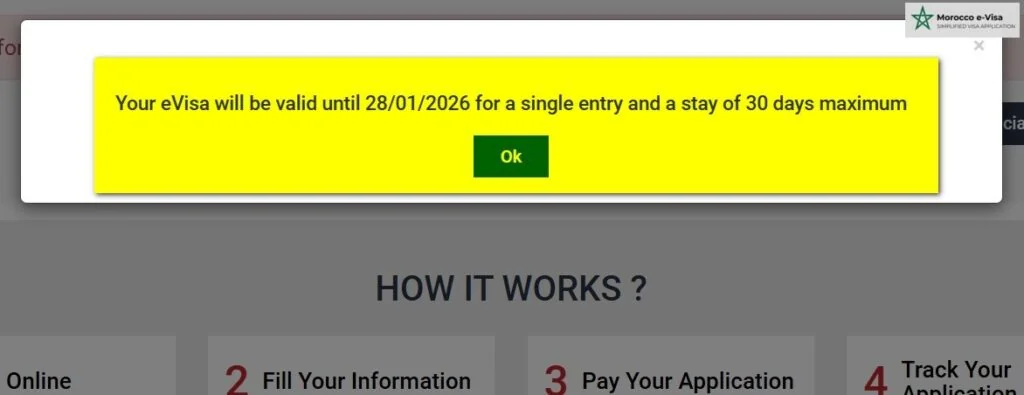
- Double-check all the details you entered, click “Enter”, and confirm your submission by selecting “Confirm your request”.


- Select “Proceed to payment”.

- Choose your preferred processing speed: Standard (about 3 business days), Express (about 1 business day). Then click “Pay”.
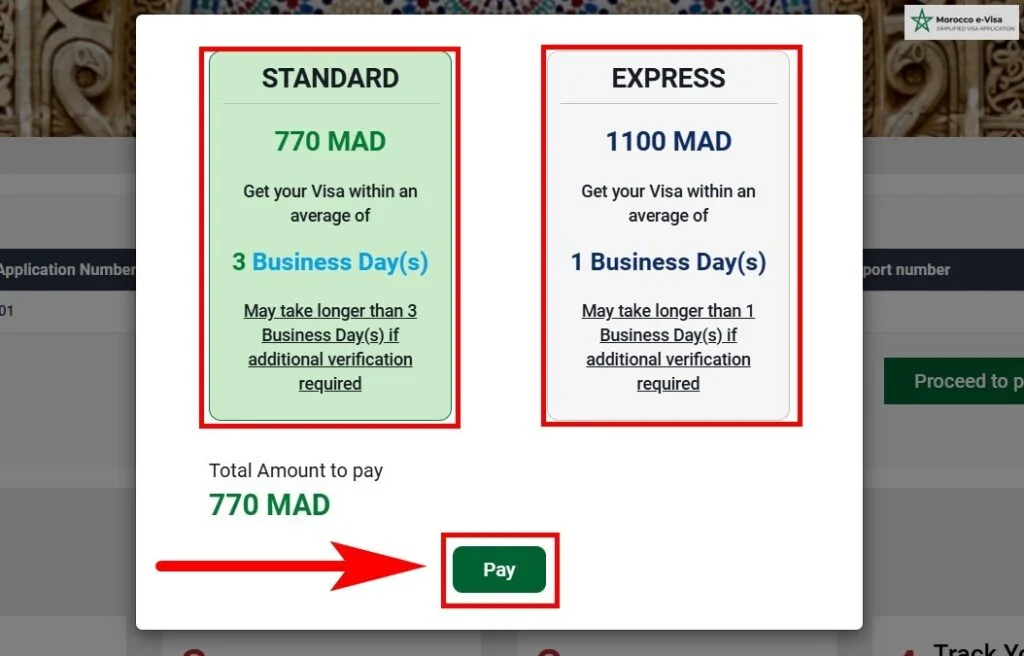
- Enter your credit or debit card information and click the green “Confirm payment” button.
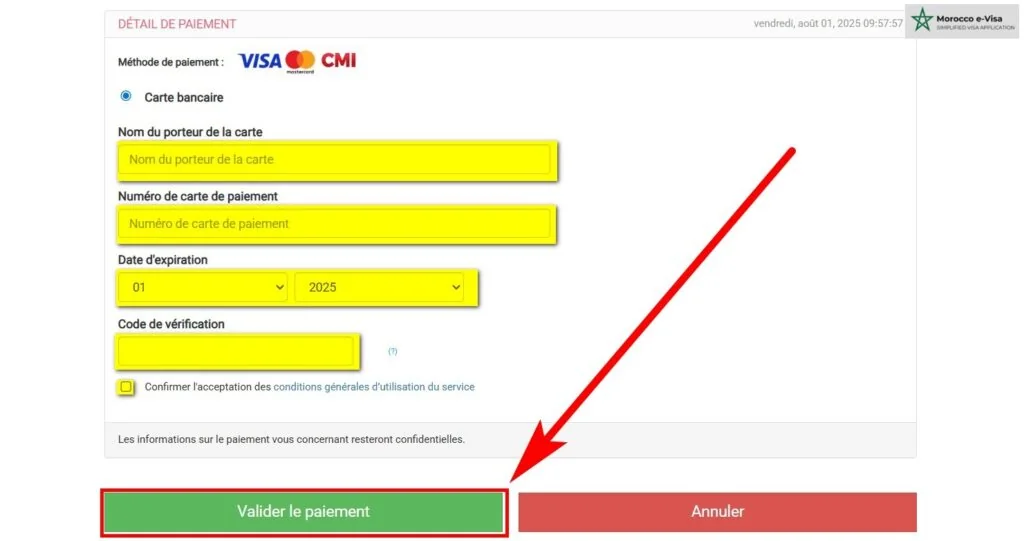
- After your eVisa is approved, it will be emailed to you. Print a copy and keep it with your passport for your trip to Morocco.
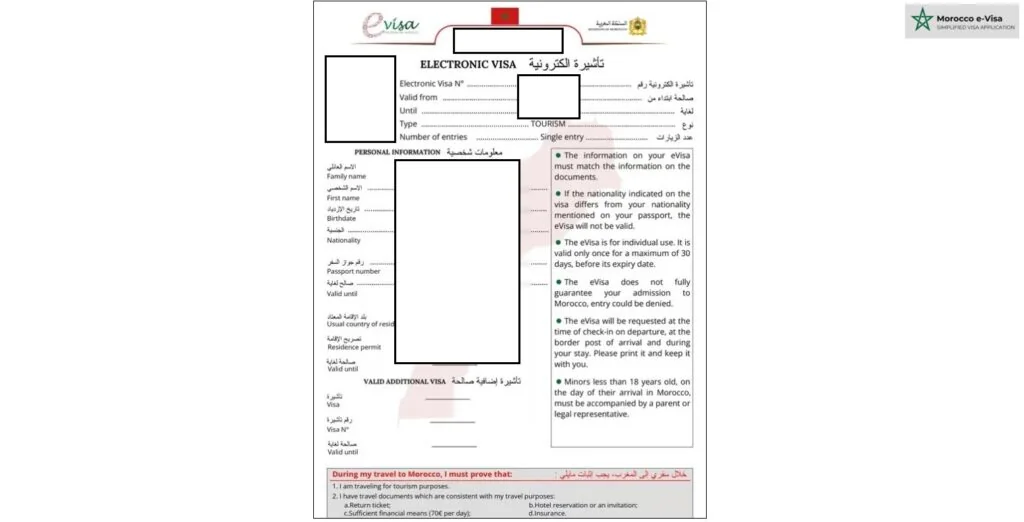
It is crucial to make sure that all the information provided in the application is accurate and complete to avoid delays or complications during the procedure.
Carefully reviewing the requirements and submitting truthful documentation will help with a smooth visa experience.
Processing Time for Morocco Visas
Most Regular Moroccan Visa applications are processed within 10 to 30 business days. However, this timeframe may vary depending on:
- The visa type requested
- The embassy’s workload
- Additional verifications or interviews (if needed)
Irish nationals are strongly advised to submit their applications at least 4 to 6 weeks prior to their planned departure date.
This allows sufficient time for processing and helps eliminate any last-minute delays or complications.
Entry Requirements to Morocco for Irish Citizens
Irish travelers heading to Morocco should verify that they meet all entry requirements to avoid any issues.
Being aware of the regulations will help guarantee a smooth arrival in Morocco. The following documents are required upon entry:
- A passport with at least 6 months of validity,
- A residence card (if applicable),
- A visa (if necessary),
- A return ticket,
- Proof of sufficient funds (such as an international bank card or cash equivalent to more than 70 euros per person per day of the stay),
- Travel insurance covering the duration of the visit.
It’s essential to have all the proper paperwork ready, as Irish nationals without these documents will be denied entry into Morocco.
Double-check that all files are valid and complete to prevent any issues at the border.
Morocco Diplomatic Mission for Irish Citizens
Irish citizens can contact the Moroccan Embassy in Dublin for assistance with visa applications or other travel-related inquiries.
The diplomatic mission serves as a vital link between Ireland and Morocco, providing essential support for legal documentation.
It’s also where you can get information on Moroccan culture, business opportunities, and tourism.
Additionally, the embassy can assist in emergencies, such as lost passports or consular services for Irish citizens in Morocco.
- Address: 39 Raglan Rd, Dublin, D04 KW35
- Phone Number: +353 1 660 9449
- Email: embassy.dublin@maec.gov.ma
FAQ about Morocco Visas
- Can Irish citizens stay in Morocco without a visa?
Irish citizens can stay visa-free in Morocco for up to 90 days. For longer periods of specific travel purposes, such as work or study, a visa is necessary.
- Are there any specific vaccination requirements?
Irish nationals may need yellow fever vaccination proof if coming from a region of risk.
- What documents do I need to enter Morocco visa-free?
You need a passport with at least 6 months of remaining validity. It is also recommended to have proof of onward or return travel and sufficient funds for your stay.
- Can I work in Morocco on a Tourist Visa?
No, a Tourist Visa does not allow you to be employed in Morocco. You will need to obtain a proper Work Visa or permit from the Moroccan authorities.
- What should I do if my Morocco visa application is denied?
If your Morocco visa application is denied, you can inquire with the Moroccan Consulate or Embassy about the reason for the refusal.
Conclusion
Irish citizens can visit Morocco without a visa for up to 90 days, making it an ideal destination for short trips and holidays.
However, to stay longer than this period, you must apply for a visa through the Moroccan Embassy before your initial 90-day timeframe expires.
It is important to make sure your visa application is submitted in advance to avoid overstaying your allowed duration.
Visiting beyond the permitted 90 days without proper authorization can lead to penalties, fines, or even restrictions on future travel to Morocco.
